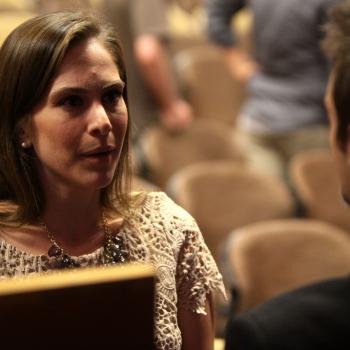I fell into the trap that Allison Lynch calls her readers out for in the first sentence of her guest post on Unfundamentalist Christians and became indignant at the title: “Here’s Why Progressive Christianity Just Doesn’t Work.”

It’s a good title, and it accomplishes what it’s meant to: get clicks. Lynch is (at least based upon this one post) an excellent writer, and Unfundamentalist Christians continues to prove itself the leader in engaging, thought-provoking progressive Christian content (it’s where I got my start on Patheos, after all).
The problem isn’t that it’s not good; the problem is that it’s wrong. Wrong on its face, wrong in its arguments and internal logic…just, wrong.
Lynch defines Progressive Christianity exclusively by negations, by expressions of what progressive Christians don’t believe. I suppose it’s fitting for a blog like Unfundamentalist Christians, but as most progressive Christians would tell you (Dan Wilkinson included, I’m sure), Progressive Christianity is at its heart a very positive religion.
Lynch lists some of the main negative tenets of Progressive Christianity, and dismisses them as nonsensical at best, hypocritical at worst. For example:
In a way, Progressive Christianity allows people to choose what they want to believe in the Bible, and to be evasive when it comes down to what the Bible actually says. For example: trying to defend the Bible’s stance on homosexuality. Yes, it’s true that Jesus did not condemn it. Yes, only six verses explicitly mention same-sex relations. But there’s no getting around the fact that the Bible calls it “an abomination, just as there’s no getting around Paul telling wives they need to be submissive to their husbands.”
That’s true, there isn’t. But the objective of Progressive Christianity is not to “get around it,” but rather to understand why the Bible says what it says, and whether or not its reasoning makes sense in a modern context (also, Paul didn’t actually say that).
Progressive Christianity isn’t about negating the parts of the Bible that we deem unsavory: it is about affirming the parts of the Bible that are life-giving; it is about affirming the idea that all people, especially the marginalized, deserve the love of God and the compassion of humans.
Lynch criticizes this, as above (“…allows people to choose what they want to believe in the Bible”), and later:
While viewing the Bible through a progressive lens allows us to dissect the cultural and historical contexts of Scripture for better understanding, it ultimately frames the “truths” of Christianity as merely a house of cards. We cannot claim Christianity as the “one true religion” anymore if Scripture is refuted.
Working backwards, the end of that quote is the most problematic. Why should questioning the scientific accuracy of stories written thousands of years ago serve in any way to “refute the Bible”? Is that the point of the Bible? To record history and science? Or is it possible that those ancient Jews were onto something else, and that the meaning and importance of the Bible do not depend on its literal-factual veracity?
Even more crucially, Progressive Christianity does not and should not claim Christianity as the “one true religion.” Progressive Christianity doesn’t just mean Christianity with progressive social views (although that is a part of it); it means Christianity with a progressive theological outlook. At a minimum, that means affirming that there are multiple valid pathways to God and that Christians can claim no monopoly on the Sacred (at a maximum, it means being like me and rejecting theism entirely while remaining a practicing Christian).
Lynch even recognizes this fact, writing a few sentences later:
If you are truly progressive in your Christian faith, you recognize that there are other ways to know God.
So either Lynch is writing to some tiny minority of self-identified “progressive Christians” in name only, or she has stopped her argument too soon: the next sentence should read, “And you are free to choose whichever way makes the most sense to you.”
Lynch’s distaste for Progressive Christianity seems to stem from her personal experiences with it, and I cannot speak to that. As with literally every religion, there are going to be some dark corners. But Lynch’s piece falls into the old trap of fundamentalism: characterizing a group exclusively by the beliefs she believes they hold.
Lastly, to Lynch’s point about the Bible:
We were not there, we did not write it, and if we are disagreeing with the only text that’s supposed to “guide our paths,” then what are we doing trying to find our identity in it?
This, again, is fundamentalist Christianity, not Progressive Christianity. This question was tackled with the mastery of a genius theologian by John Dominic Crossan in his book How to Read the Bible and Still Be A Christian, and I will repeat its basic argument in response to Allison Lynch.
Christians, and especially Progressive Christians, should not “find our identities” in a text. With respect to our Muslim comrades, we are not “people of the book;” our identities are grounded not in Torah or Quran, but in a human being.
That is why the Bible calling homosexuality an abomination isn’t an issue: Jesus did not condemn it. That is why pseudo-Paul telling wives to be submissive does not matter; Paul (or the reactionary who wrote those verses) is not Jesus.
To paraphrase Crossan: Jesus is the norm and the criterion of the entire Bible.
That is Progressive Christianity, and that is exactly why Progressive Christianity does work.












